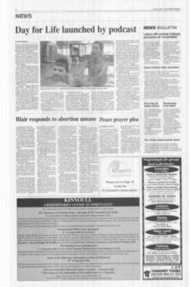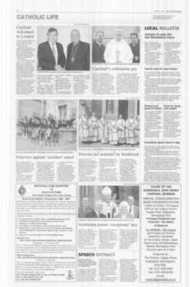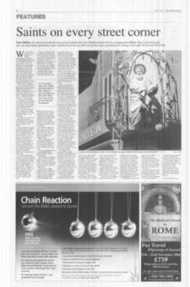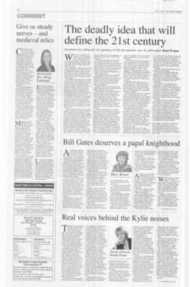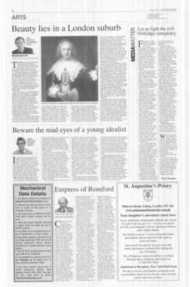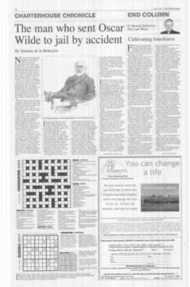Page 1, 23rd June 2006
Page 1

Report an error
Noticed an error on this page?If you've noticed an error in this article please click here to report it.
Tags
Share
Related articles
Health Secretary Rejects Cardinal's Plea For An...
Most British Women Want Abortion Law Tightened Up, New...
Ulster Campaigns To Stop Change In Abortion Laws
Blair Responds To Abortion Unease
New Pm Urged To Conduct Urgent Abortion Law Review
Cardinal persuades Blair to support review of abortion law
8( SIMON CALDWELL
bNY BLAIR has signalled to the hader of the Scottish Catholic thurch that he is ready to allow tine for Parliament to review fritain's abortion laws.
The Prime Minister told Cardinal kith O'Brien, the Archbishop of St Andrews and Edinburgh, that new nedical and scientific advances jtstified a parliamentary debate of tie 1967 Abortion Act with a view a amending the legislation.
His comments came during a neeting with the cardinal in his ofice in the House of Commons ater Prime Minister's Questions lat week.
But while Mr Blair was willing to dscuss the issue with Cardinal CBrien, Tory Party leader David Cameron refused outright to grant hm an audience, causing him evere disappointment".
Peter Kearney, a spokesman for tie Catholic Church in Scotland, ski the cardinal had told Mr Blair tlat "he felt the time had come for areview of the abortion legislation ad he would like to see a public and pirliamentary debate on the abject".
"Tony Blair's response to that vas to agree there were grounds Ito ropen the Act], he accepted that." sid Mr Kearney. "As far as the kime Minister is concerned it vasn't closed. 'There are some troubing issues' was how he put it. He
as talking about the science of ito-natal care and how it has inproved so survival rates have itreased for early-term babies."
But the Prime Minister, who has wed in favour of abortion throughoit his career, stopped short of gving any "promises or undertakfigs" to the cardinal.
During his three-thy visit, the ordinal attended a dinner given in us honour by Michael Martin, Speaker of the House of Commons.
He met Sir Menzies Campbell, leader of the Liberal Democrats, and Alex Salmond, the leader of the Scottish Nationalist Party, as well as the Chancellor, Gordon Brown, and Hilary Berm, Secretary of State for International Ekvelopment. A reception was also hosted by Douglas Alexander, the Scottish Secretary.
But Mr Cameron insisted from as early as February that he was too busy to meet the cardinal. Further efforts to arrange a meeting were made as the details of Cardinal O'Brien's visit were being finalised in recent weeks but Catholic officials were informed that Mr Cameron would be out of the coun try.
Cardinal O'Brien was then surprised to see Mr Cameron from the public gallery of the House of Commons during Prime Minister's Questions. Mr Kearney said: "We saw David Cameron come in. Aterwards we were able to go to Tony Blair's office for a meeting but were not able to go to David Cameron's. Our opinion of the matter was severe disappointment that David Cameron wasn't able to make time for a short meeting. It was a lost opportunity for the Tories. It would have been helpful to meet and discuss mailers of mutual interest but we would still hope to meet at some time in the future. 1 know Cardinal O'Brien would be glad to meet him."
Mr Cameron's spokesman insisted that a meeting was not possible. "There are lots of demands on David's diary," he said.
But Labour MP Jim Dobbin, who met the cardinal. described the failure of Mr Cameron to find the time to meet the Cardinal as a "political blunder". He said: "I don't know how that happened. David Cameron was around all day."
Mr Cameron's snub came as MPs put renewed pressure on the Government to grant time for a debate on abortion.
Since the passage of the 1967 Abortion Act the issue has been seen as one of conscience and any changes to the law have been made through Private Members' Bills.
But Mr Kearney said that as an alternative Cardinal O'Brien supported an Early Day Motion (EDM) put forward in the House of Commons the day after his meeting with Mr Blair which called for the abortion laws to be reviewed by a committee of MPs. and peers.
Sponsored by Geraldine Smith, the Labour MP for Morecambe, the motion called on the Government to set up a joint committee to "consider the scientific, medical and social changes in relation to abortion that have taken place since 1967, with a view to presenting options for new legislation".
Of the first 11 signatures, nine belonged to Labour MPs. The motion has been signed by both pro-life and pro-choice Mr Kearney said: "lf enough MPs endorsed that it would create a broad-based committee that would then take evidence on the topic across the political spectrum.
"We would endorse that initiative. Our feeling is that this would be a sensible way to have a debate."
He added: "There is an onus on Catholics across the UK to urge their MPs to sign EDM 2379. There is no reason why people can't start making contact now. This is something that would be good to see a campaign develop on."
Cardinal O'Brien's discussion with Mr Blair also came a week before Cardinal Comae MurphyO'Connor, the leader of the Catholics of England and Wales, was due to raise the issue of time limits in a meeting with Health Secretary Patricia Hewitt.
Both cardinals believe that the British public has undergone a "moral awakening" about the humanity of the unborn child.
Continued on Page Tivo
Catholic Life: Page 6
Editorial comment: Page 11
blog comments powered by Disqus



